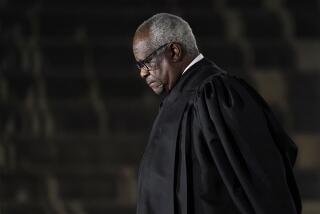Payments to Black were disclosed, witness says
- Share via
CHICAGO — Defense attorneys at the fraud trial of former media baron Conrad Black and three associates produced documents Monday that a prosecution witness agreed showed payments at the heart of the case had been publicly disclosed.
Fred Creasey, the former comptroller who oversaw the finances for Black’s media empire, said company documents filed with the Securities and Exchange Commission did include millions of dollars in so-called noncompete payments to company executives.
“Shareholders were told, then, exactly how much of the proceeds of the sales of U.S. community newspapers were paid to individual officers?” defense attorney Michael Schachter asked Creasey.
“I believe so, yes,” Creasey replied during his second day of cross-examination.
Last week, Creasey testified that he spent a week in 2003 trying to document whether the boards of directors for Chicago-based Hollinger International Inc., and its Toronto parent, Hollinger Inc., had seen and approved the payments.
At issue were two sets of payments made to Black and three associates from two huge sales of Hollinger International properties -- one of U.S. community newspapers and the other of Canadian papers -- as Black unwound one of the world’s largest media conglomerates.
The noncompete payments were money set aside from the purchase price to satisfy a guarantee that Hollinger -- or any executive who signed a noncompete agreement -- would not reenter a market where one of its newspapers had been sold.
Prosecutors contend that most of the payments were illegal and that Black and his three codefendants diverted a total of about $60 million from Hollinger International by sending payments from noncompete agreements to themselves and to entities more closely controlled by Black such as Hollinger Inc. Black then used the money to fund a lavish lifestyle, prosecutors said.
Of the 3.2 billion Canadian dollars realized from the sale of Canadian papers to CanWest Global Communications in 2000, 80 million was allocated to noncompete payments including 12 million to Black and 1.3 million each to codefendants Jack Boultbee, his chief accountant, and Peter Atkinson, his top lawyer.
Prosecutor Julie Ruder sought to show how regulatory filings either mischaracterized the noncompete payments to executives as necessary to the deals or incompletely explained which executives got how much.
“Where did it say in the [regulatory filing] that Mr. Boultbee was going to receive noncompete money as a result of the CanWest deal?” she asked Creasey.
“It doesn’t,” he replied.
Regarding noncompete money paid to the executives by the U.S. subsidiary of Hollinger International after the sale of U.S. papers worth nearly $500 million was completed, Ruder asked, “Are shareholders being told that the $5.5 million was part of the sale of the United States newspaper group?”
Creasey replied they were.
“Was that accurate?” she asked.
Creasey responded, “No.”
More to Read
The biggest entertainment stories
Get our big stories about Hollywood, film, television, music, arts, culture and more right in your inbox as soon as they publish.
You may occasionally receive promotional content from the Los Angeles Times.










